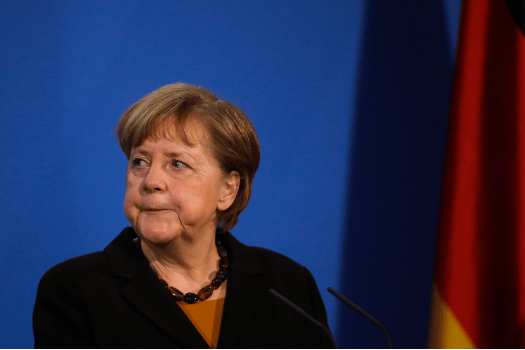These are the new powers that Merkel plans to acquire in battle against pandemic

An update to the disease control law is expected to be rushed through the German Bundestag next week. According to several newspaper reports, it will give the central government the power to enforce tougher lockdown rules including night-time curfews.
After cancelling the lockdown summit that was supposed to happen on Monday, Chancellor Angela Merkel's government will write up a draft law that will be presented to the Bundestag in the next two weeks.
The law will hand the federal government powers over lockdown rules that have until now been the preserve of the federal states.
Several German media outlets including der Spiegel and Bild have seen the draft law.
The bill will reportedly give the federal government power to implement a long list of restrictions. The restrictions will kick in when coronavirus cases rise above a 7-day incidence above 100 cases per 100,000 inhabitants on three consecutive days.
The rules are the following:
- A strict night-time curfew will be enforced between the hours of 9pm and 5am.
- Districts will also have to close all stores except for those necessary for essential daily needs (supermarkets, pharmacies and hairdressers.)
- Private contacts will be restricted to one person outside one’s own household per day. Such groups will also be limited to a total of five adults
- Restaurants, cafés and company canteens must remain closed. However, food delivery will still be possible.
- Leisure facilities such as swimming pools, amusement parks, or saunas will be closed. Zoos, theatres, operas, cinemas and museums will likewise have to close.
According to a report in Bild newspaper, schools will only have to close if the 7-day incidence in the district rises above 200.
Many of the rules come straight from the an agreement made between the central government and the states at a lockdown summit in early March.
But some states proved reluctant to impose the so-called ‘emergency brake’ that would put them back into a hard lockdown, despite having infection rates above the 100 barrier.
This led an angry Merkel to warn that she would seek a change to the disease protection law that would put more powers into her hands.
Under the new legislation, districts that have a 7-day incidence above 100 would be legally obliged to pull the emergency brake.
READ MORE: Germany to tighten national coronavirus law in bid to ‘create uniform rules’
Comments
See Also
After cancelling the lockdown summit that was supposed to happen on Monday, Chancellor Angela Merkel's government will write up a draft law that will be presented to the Bundestag in the next two weeks.
The law will hand the federal government powers over lockdown rules that have until now been the preserve of the federal states.
Several German media outlets including der Spiegel and Bild have seen the draft law.
The bill will reportedly give the federal government power to implement a long list of restrictions. The restrictions will kick in when coronavirus cases rise above a 7-day incidence above 100 cases per 100,000 inhabitants on three consecutive days.
The rules are the following:
- A strict night-time curfew will be enforced between the hours of 9pm and 5am.
- Districts will also have to close all stores except for those necessary for essential daily needs (supermarkets, pharmacies and hairdressers.)
- Private contacts will be restricted to one person outside one’s own household per day. Such groups will also be limited to a total of five adults
- Restaurants, cafés and company canteens must remain closed. However, food delivery will still be possible.
- Leisure facilities such as swimming pools, amusement parks, or saunas will be closed. Zoos, theatres, operas, cinemas and museums will likewise have to close.
According to a report in Bild newspaper, schools will only have to close if the 7-day incidence in the district rises above 200.
Many of the rules come straight from the an agreement made between the central government and the states at a lockdown summit in early March.
But some states proved reluctant to impose the so-called ‘emergency brake’ that would put them back into a hard lockdown, despite having infection rates above the 100 barrier.
This led an angry Merkel to warn that she would seek a change to the disease protection law that would put more powers into her hands.
Under the new legislation, districts that have a 7-day incidence above 100 would be legally obliged to pull the emergency brake.
READ MORE: Germany to tighten national coronavirus law in bid to ‘create uniform rules’
Join the conversation in our comments section below. Share your own views and experience and if you have a question or suggestion for our journalists then email us at [email protected].
Please keep comments civil, constructive and on topic – and make sure to read our terms of use before getting involved.
Please log in here to leave a comment.